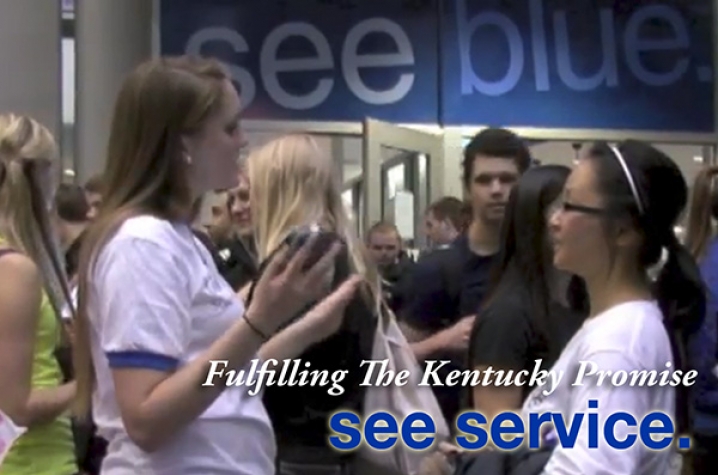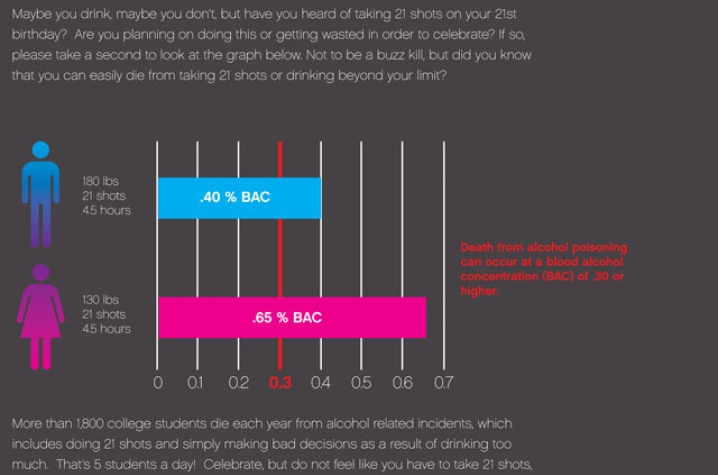Student Wellness Ambassadors Encourage Thinking About Drinking
LEXINGTON, Ky. (March 12, 2013) — Robust with meaningful campuswide programs, yet agile enough to address the specific needs of one student, the University of Kentucky Division of Student Affairs Office of Substance Education and Responsibility has changed dramatically over the years to accommodate the needs of the students.
Led by director Andrew “Drew” M. Smith and assistant director Rachel Carnahan, the office’s role is to provide substance education and abuse prevention information to UK’s undergraduates and to develop educational programming for students found in violation of any institutional substance policy, be it alcohol, drugs or tobacco. To address those roles and others, Smith and Carnahan conduct extensive research to obtain a “snapshot” of each freshman class’s habits and practices related to alcohol and drug use. Additional surveys are completed each year throughout the students’ years at UK.
Much has been learned of histories and trends in these survey results, but the most important outcome is the knowledge that the best teachers are the students’ peers and that college students have significant impact on younger students, from high school through elementary school age. Consequently, SEAR has created an effective all-UK-student volunteer force, Student Wellness Ambassadors (SWA), to carry the message to young elementary-age children as well as peers at the university.
“The Office of Substance Education and Responsibility does not gear its messages toward anti-drinking,” Smith said. “We are keenly aware that many of our college students choose to drink while underage. We offer a variety of resources that encourage responsible decision making, including abstinence, in order to help keep our students and the surrounding community safe and healthy.”
The Student Wellness Ambassadors are dedicated to empowering their peers to live safe and balanced lifestyles by providing them with information, screenings and resources in the areas of mental wellness, drugs and alcohol abuse.
“This is a group of highly motivated and well-trained students who organize educational programs and events throughout campus and the community,” said Smith. “The Wellness Ambassadors believe that all (college) students have the right to make their own decisions on issues; they just help provide them with quality, research-based information.”
SWA schedules several campus-based events throughout the year that allow students to discuss these vital issues in a safe, accepting environment. They also reach out to students when they least expect it, through a message disguised as a 21st birthday card. The "legal age" birthday can be a time of significant concern, when students might overindulge to a lethal level. The message proclaims the deadly danger inherent in the practice of taking 21 shots of alcohol on a person’s 21 birthday. Consuming that amount of alcohol in 4.5 hours can take even a healthy 180-pound young man to the point of alcohol poisoning.
Students receive the card via their UK email. The program has already proved to be a success, and the office has had students comment on how great it is that such a large university is taking the time to look after its students.
“I think these (21-21 Birthday Cards) are a great idea for the university,” said Nathan Brummett, 2012-2013 K Crew coordinator. “Turning 21 is a big deal for many students, and no one wants to have their birthday ruined by poor decisions they make. These cards will make students think twice about their actions and remind them of choices they make.”
Carnahan said some students often reply to the cards with a simple, "Thank you and I will keep that in mind." She said this is what she loves.
"We just want the students to be educated on the dangers of downing a ridiculous number of shots, because believe it or not, a lot of them aren't aware," she said. "We are hoping that when they are out and about celebrating their birthdays that this information is in the back of their head when they are making decisions. We want our students to see their next birthday and not wake up regretful."






